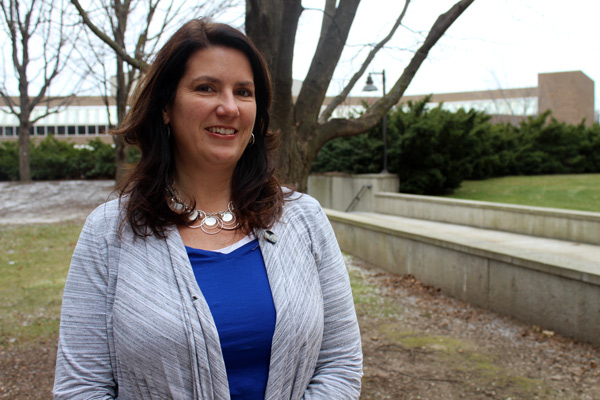UM-Flint Education Alumna Uses Research Skills to Change Policy

When University of Michigan-Flint education alumna Dee Dee Heberling observed her kindergartners attempt to take a state-standardized test shortly after the school year began, she felt uneasy.
She observed that most of the children taking the test at Kingsbury Country Day School in Oxford did not know how to use a computer very well, click and drag correctly with a mouse, or understand how to enter an answer to a question, even if they came up with the right answer.
Like many other charter schools in the state, the school was following a directive with the best interests of the children in mind. However, as beginning kindergartners and novice test takers, the children struggled with the challenges that the testing process and progressively difficult material presented to their developing minds.
The test itself seemed to contradict the research-based early childhood assessment strategies Heberling had learned while studying for her Master of Arts degree in Early Childhood Education at UM-Flint. Requiring young children to take the test again in the spring in order to compare results with the previous test also seemed problematic, though in line with data collection trends.
"There is a national push for data without a concern for the authenticity of it," Heberling explained. "A lot of weight is given to these tests, but the data is meaningless because it's not authentic. I felt like the test was going against everything I was learning in graduate school."
Seeking Authentic Assessment Methods
Collecting and reviewing multiple samples of children's work to assess for skills in communication, math, science, and language, and making close observations of their skills in problem-solving, social development, and verbal and receptive language skills were all better methods to use to evaluate children.
Heberling learned these methods in her graduate courses at UM-Flint, and they also matched her own experiences from teaching young children in preschool and kindergarten.
"I learned a lot in graduate school about how important observation is in early childhood education and that it's a more authentic assessment of a child's development," said Heberling, who graduated Summer 2016. "They do things and create. They solve problems, learn to count, and build social and language skills through play. We have year-end objectives and guidelines, too."
Advocating with Research & Passion
So Heberling decided to intervene on behalf of her kids last year. She began digging into the research behind authentic early childhood assessments, communicating her concerns with the staff and administrators at her school, and presenting her research findings to them.
"I felt like somebody needed to be advocating for these kindergartners, and I was using research that made it hard to disregard what I was saying," she said.
She is very grateful to work in a collaborative teaching and learning environment like Kingsbury Country Day School. "They try to do what's best for the students and they felt this was an important area to address," she said.
Soon she had convinced the school to drop the fall standardized test completely and look for more developmentally appropriate ways to measure each child's level upon entering kindergarten. Although a spring test is still in place to provide data towards a child's readiness to enter first grade, children will take that test on iPads, a device which they are more familiar with, rather than computers.
Heberling credits her UM-Flint early childhood education professors and master's program for equipping her with the knowledge to make change happen in her school. Pursuing her graduate degree later in life, she felt welcomed and nurtured by the professors who supported her interests and success: "I liked the resources and the camaraderie with my peers. If I'm passionate about something, I will research it."
For more information about early childhood academic programs at UM-Flint, visit www.umflint.edu/earlyeducation.
Related Posts
No related photos.
- Alumni
- Career Development
- Center for Educator Preparation
- Early Childhood
- Early Childhood Development Center
- Education
- Graduate Programs
- K-12
- Research
UM-Flint News
The Office of Marketing & Communications can be reached at [email protected].